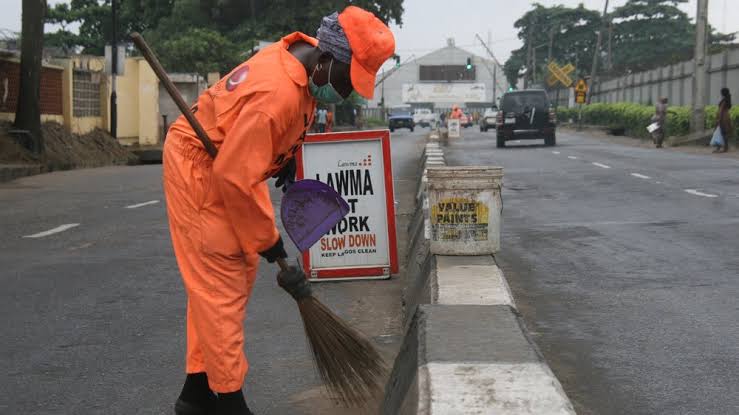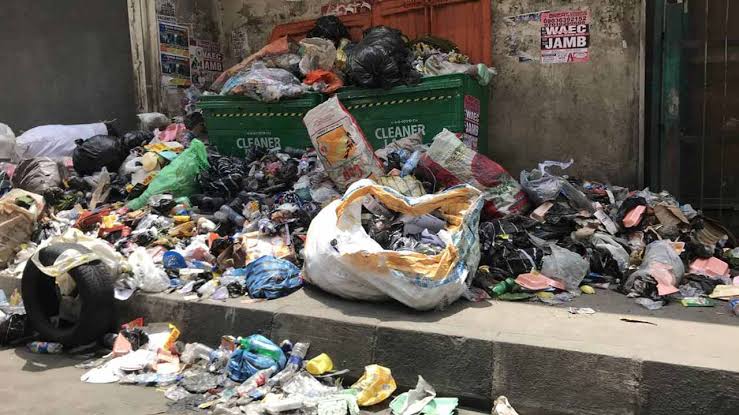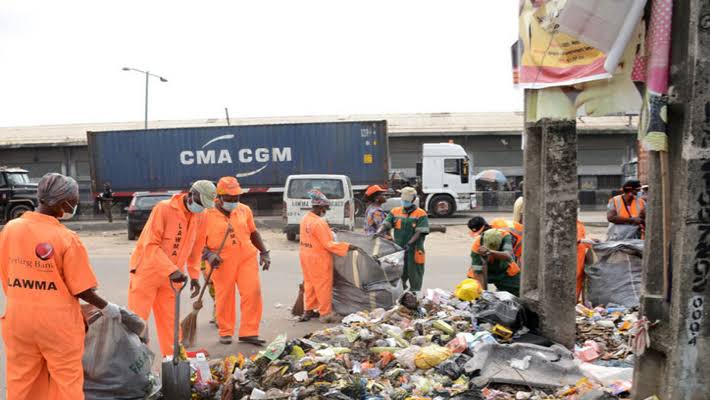WASTE MANAGEMENT & DISPOSABLE CRISES

For a publicly managed waste management and recycling system under Workers Management & Control
By Segun Ogun
Amid the growing capitalist crises in modern-day Nigeria is the exacerbating nature of the environment. While multi-national corporate oil-producing organisations and manufacturing companies continued to pollute the environment with various forms of liquid and solid waste, domestic waste production is at varying degrees causing more harm and damage to human and environmental health.
There is no doubt that the multi-national companies account for the huge environmental pollution in the atmosphere, but the crises of waste products from various local communities and households are as well increasing the level of concern due to the lack of public planning and management by the state.
The failure of the government to constitute democratic waste management under the control of the working people has further compounded the crises of irregular waste evacuation and poor waste management systems of the country leaving the business to only private profiteers. For developing countries like Nigeria, waste production from domestic households is also a fundamental problem since the capitalist ruling class sees no benefit investing in adequate sanitation and maintaining environmental standards at all levels. On this basis, waste evacuation and management are similarly abandoned for various households.
With working class household battling with excruciating hard times to meet their basic needs like food, they can ill afford to squeeze anything out of their poverty drained pocket to adequately dislodge their wastes. The aftereffect of this is every nook and cranny such as drainages, market places, highways, streets, and canals are dumping grounds for waste materials and this could only be possible with the absence of a waste management structure that will convert waste products to other uses.
Waste management and poor environmental health have been a characteristic of the capitalist contradictions of urbanization in 21st-century Nigeria. Even in the face of profit-first real estate developers displacing government housing schemes, provision for adequate spaces and management systems for waste is completely ignored.

The few rich individuals access Private Sector Participants waste operators who are contractual agents of the government in waste evacuation and house-to-house collection. The poor masses that live in no mansions or less-developed communities and the homeless people are left with the options of living with their waste or using the nearby streams and rivers to dispose of their waste. The major form of waste disposal in the working class community is dumping in public drainages and sewages during rainfall.
The wide spread of communicable diseases, most especially the recent emergence of Lassa fever is not unconnected to the unhealthy and poor environmental hygiene, a consequence of a better waste management disposal system. The same is true of diseases such as trachoma, scabies and acute respiratory tract infections (such as acute rheumatic fever) that are largely regarded as diseases of the poor.
The profit-first approach to waste management has further escalated Nigeria’s societal problems, making survival more difficult and healthy living a matter of the money-first orientation. The ruling class have shown no concern in improving the living standard of the people and thereby left the business of waste management to their cronies and political contractors to rake as much as funds possible from the ordinary working masses in the name of private operators. The high charges from the operators is forcing resident who cannot afford to pay for the services to resort to dumping of waste into gutters or any open spaces.
In Lagos for instance, every corner of the state is an eyesore. Refuses, feaces and other waste materials are littered in most parts of the place. The operation of the Private Sector Participants, (PSP) who collects waste on a house-to-house basis and dumps it at government-provided landfills, is not regulated. With government backing, the operators use court summons to pursue residents to pay for the services that are not regular. Needless to stress that the PSP is consequentially forced out of business due to government change in profiteers or the introduction of new contractors.
The inability of the poor people to pay PSP levies and the failure of the government to enforce and regulate the waste management sector have complicated the crises of environmental health and waste management systems. This further shows the inherent contradiction of the profit-first system that placed concerns for private pockets over humanity. The poor and working masses living in slumps and undeveloped areas are further abandoned to use nearby dump-sites, streams and rivers for all forms of waste disposal.
The interconnectedness of these problems is majorly placing the human environment at the mercy of capitalists’ irresponsibility causing more degeneration for human and environmental health challenges. The environment cannot in any way be organized better under the current profit-first arrangement; it is a society based on democratic control of the means of production and collective control of the distribution of commodities that can pave way for a productively and more organized society where human lives and public interest will be prioritized over the profit of few private individuals.

This should be merged with the public control and public ownership of environmental resources; making waste collection and management a collective affair of the people where waste evacuators, sanitarians and waste collectors will be officials of the local government administrators. This makes the mass working people and poor communities have equal access to waste collectors and sanitarians.
However, in Oyo state, waste crises have in no way differed from other existing situations across the country. As at today, Oyo state is marked as one of the dirtiest states in Nigeria. This is in the presence of the fact that the state has abundant human resources and environmental professionals to manage the state waste sector. But then, the money-first mentality of Governor Seyi Makinde-led PDP government has proferred no solution rather it has further compounded the problems.
The Oyo state PSPs were engaged under a contractual arrangement for periodic terms of two years between 2020 and 2022. Their contract was terminated after the expiration of the term, with the Governor engaging a new set of waste management contractors, who have proved incapable of effectively managing the waste of the state.
These developments disoriented the Oyo state PSP groups and in their numbers were forced to stop work. It was a matter of two-three days for the street and communities to be filled up with garbage and litter. This arbitrary termination of contracts led to the PSP’s crystallization into a legal entity of an association. The Association of Waste Managers as they called it is now the umbrella for all PSPs dealing with waste collections and evacuations.
The MSA completely stand oppose to this contract system, and insist that waste management be brought under the democratic control and management of the working people. We also in turn condemn the situation wherein the power of approval and engagement of the PSP waste management operators is solely that of the governor, this is what has resulted into a situation where only his cronies are appointed as a form political patronage in return for the supporting the governor. Without mincing words, the capitalist contract system needs to be abolished; a service orientated waste management systems and recycling sector must be democratically managed and controlled by all stakeholders, waste management workers, community people and local government administrators.
The MSA calls for: A sustainable and democratically planned economy, to address the needs and the well-being of all. And also stand against privatization of the waste sector to further enrich the capitalist few rich individuals. We call for the public ownership and control of the waste management, through the employment of waste collectors and managers as workers of the local government authorities. Government must be responsible and commit to proper funding of the waste sector, to also include proper management of landfills and public control of the activities of private manufacturing companies.
For a socialist Green programme for waste management through massive public investment in the waste recycling sector; renewable energy, eco-friendly constructions and adequately planned public transportation.
Stop the main polluters: take the big manufacturing industries and big polluters as well as major banks and control of private eateries, transport and agro-businesses from the hands of the few rich individuals and place them under public control management of community people, stakeholders and the society as a whole.
